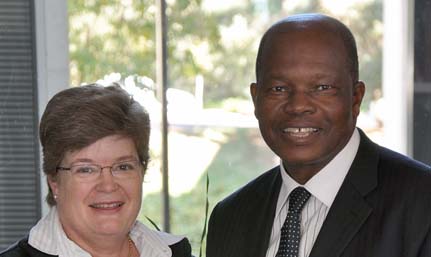Latest News Archive
Please select Category, Year, and then Month to display items
11 January 2021
|
Story André Damons
|
Photo Supplied
 Dr Ralph Clark
Dr Ralph Clark
The Afromontane Research Unit (ARU), the flagship research group of the University of the Free State (UFS) Qwaqwa Campus, has recently been granted R8,4 million to establish a Risk and Vulnerability Science Centre programme.
The Risk and Vulnerability Science Centre (RVSC) programme was established by the Department of Science and Innovation (DSI) as part of the Global Change Research Plan for South Africa and is funded by the DSI through the National Research Foundation (NRF). The RVSC will focus on the need to generate and disseminate knowledge about risk and vulnerability on global change challenges faced by local policy makers/ governance structures and communities in South Africa.
Invited to participate
Dr Ralph Clark, Director of the ARU, says the UFS, together with the University of Zululand and the Sol Plaatje University, has been invited to participate in Phase 2 of the RVSC programme. Dr Clark was approached by the DSI (on referral from the South African Environmental Observation Network – SAEON) in February 2020 regarding the potential for establishing a RVSC at the UFS Qwaqwa campus.
Subsequent interactions were held between the UFS and DSI, and in March 2020, the UFS formally accepted the DSI invitation. It has since been agreed that the RVSC: UFS will be hosted as a RVSC under the ARU umbrella, with dedicated personnel embedded at the UFS in this regard (internal processes and reporting) but reporting directly to the NRF regarding the RVSC.
Interest and support welcomed
Dr Clark welcomed this interest and support from the DSI-NRF, saying that the funds will further assist the UFS in growing its excellent and growing research portfolio and building more research capacity on this traditionally undergraduate-focused campus. “The RVSC will contribute to much-needed solutions in an area marked by major sustainability challenges and will assist in moving Phuthaditjhaba away from its negative apartheid history towards becoming a sustainable African mountain city,” says Dr Clark.
Valuable advice for businesses in difficult times
2013-04-15
|
 |
|
Prof Helena van Zyl, Director of the Business School, and Dr Reuel Khoza.
Photo: Stephen Collett
15 April 2013 |
Dr Reuel Khoza, Chairman of the Nedbank Group, shared the group’s valuable rules for managing a bank in difficult times in an MBA lecture on the Bloemfontein Campus. Dr Khoza is a visiting professor at the UFS Business School.
He focused in the lecture on the group’s business and leadership model and highlighted some do’s and don’ts:
- Do not surprise your stakeholders on the downside – communicate transparently, particularly when there is bad news.
- Retrenching staff to contain costs should be a last resort – the damage to corporate culture from retrenchments is immense. Follow and support your customers – get as close to them as possible because business changes slowly, but customer behaviour can change in an instant.
- Integrated central capital and funding management.
- Entrench well-established reporting, KPIs and measurement systems.
- Ensure strong independent risk management.
- Manage your cost base – anticipate downturns and re-base your costs to avoid crisis-cost management.
- Take advantage of opportunities – an economic downturn creates a situation where valuations fall and assets are sold off, which can be a great opportunity for acquisitions.
- Keep innovating – innovation does not have to be a costly exercise, as the right culture can promote and encourage experimentation and collaboration.
- Whatever you do – avoid a price war, as expedient pricing decisions may hurt the business in the longer term.